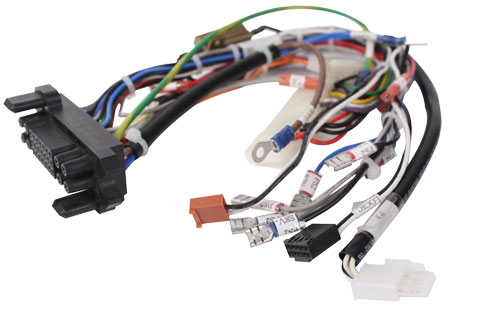A cable assembly, as the name says, is an assembly of cables or wires which is used to transfer power or information based on its material and requirement. Contrary to the single wires or cables, cable assemblies have multiple cables or wires intervened together to form a single unit. The loose wires are intervened together through various means including straps, sleeves, ties, tape etc. Cable assemblies are widely preferred over loose wires and cables in many industries, owing to the number of advantages they offer. A few advantages are as listed below.

Advantages of Cable Assemblies
A. With the help of cable assemblies it is possible to keep the innumerable number of loose wires together and organized. For industrial purposes a large number of cables are required to either transfer information or power. Thus, using cable assemblies, one can prevent these wires from getting mixed with each other.
B. In addition to a large number of wires, wires used for industrial purposes are also bulky and lengthy in nature. A few wires are so lengthy that they could be stretched over kilometers of length and leaving these wires untied would lead to tangling of the wires and high maintenance. Cable assemblies reduce this mess, and prompt to ease the maintenance.
C Also, in terms of security, having the loose wires tied and kept organized under a single assembly will prevent security issues like vibration, abrasion and moisture.
D. Bundling the wires together under a single cable assembly will reduce the space occupied and also prevent electrical hazards like shorts that are commonly seen in the case of loose wires and cables.
E. Since all the loose wires and cables are combined to form a single unit, only a single installer is enough to circulate power or information to all the wires involved. This reduces a lot of work and time that is normally used up during the installation of the single wires.
Custom Cable Assemblies
Another important reason why cable assemblies are used in a wide array of diverse industries is the fact that they can be customized to our preferences, based on a number of factors as listed below.
A. Conductor Sizes: From conductor sizes starting from as little as 34 gauge to as large as 12 gauge, conductors of all sizes can be included based on requirement and preferences.
B. Conductor Insulation: Insulation is very important for cables to prevent electrical hazards like shock and there are a wide number of insulator materials whose hardness and softness can be varied on the customer preference. PVC, PU, TPE, TPEE, TPV, Teflon and Silicone are few of the most popular insulator materials.
C. Cable Types: Different industries certainly require different kinds of cables based on their capability, cost, material and various other deciding factors. With customization, it is easier for both the customer and the vendor to assemble the right kind of cable assembly suited for that particular industrial requirement.
Apart from the above mentioned, a number of other factors like conductor colors, stranding sizes, materials of fillers, wraps and shields and jacket materials can be customized to manufacture the perfectly suited custom cable assemblies for the preferred industrial requirement.
Industries Served by Custom Cable Assemblies
A. Medical: Healthcare industry is one of the biggest industries in the world and cable assemblies are used extensively by medical professionals in hospitals to facilitate the treatment of their patients. Patient care and monitoring equipment, diagnosing machines like EEG and EKG and imaging systems like MRI, x-ray require high quality and safe custom cable assemblies that are resistant to various sterilization methods, chemicals and moisture.
B. Military: Custom cable assemblies are extensively used in military applications and devices. It is necessary that these cable assemblies are customized to withstand rough usage and harsh environmental conditions and still make no compromises when it comes to durability and reliability.
C. Telecommunications: The telecommunications industry certainly uses a lot of cables for transferring information no matter how wireless today’s technical platforms are. Telecom and broadband services use custom cable assemblies (http://www.wisegeek.com/what-is-a-cable-assembly.htm) extensively for their day-to-day activities and provide uninterrupted services to their customers.
Apart from the above mentioned, other industries like automobile, electronics, aerospace, railways, and datacenters also extensively use custom cable assemblies.